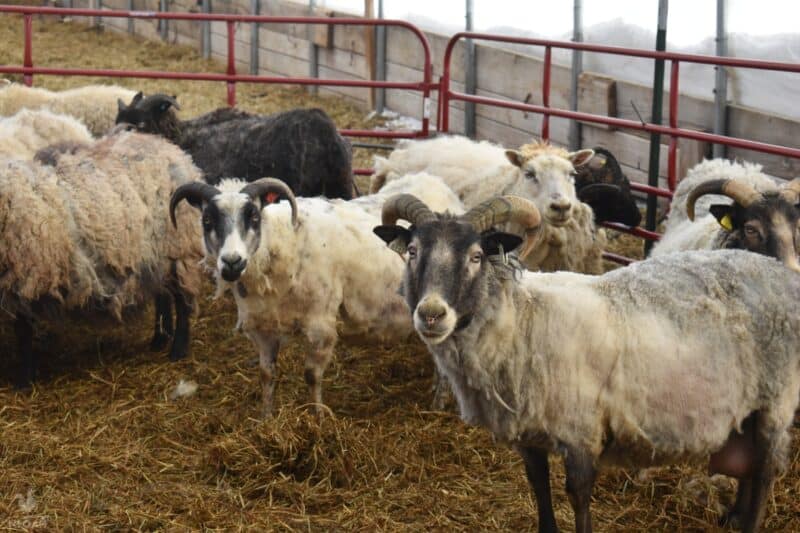Throughout the animal kingdom, almost every group, assemblage, gathering or congrex of animals has a special name assigned to it by mankind.

Cows have herds, porcupines have prickles, fish come in schools and crows gather in murders. A group of sheep is no different. But just what is a group of sheep called?
A group of sheep is called a flock. Sometimes a group of sheep might be called a herd, though this less common.
Every sheep farmer knows that a group of sheep is called a flock. But have you ever wondered why it is called a flock and not something else?
And what makes a flock different from a herd of animals that live on land? Do sheep instinctively flock? All these questions and more will be answered below!
A Group of Sheep is Ordinarily Called a Flock
Any gathering of multiple sheep can technically qualify for flock status, but the term is better used to describe a larger group.
But generally, anytime you have a group of sheep together you can refer to them as a flock, big or small.
But it Might be Called a Herd
Every now and then, you will hear people refer to a group of sheep as a herd. This is less common and usually used to describe a truly large group of sheep.
It doesn’t really matter what you call it in casual conversation, as most folks will know exactly what you are talking about.
However, flock is the word more commonly used and preferred term when referring to a group of sheep. In any case, savvy shepherds will definitely respect you more!
The Term “Herd” is Typically Associated with Cattle
It should be pointed out that the term “herd” is far more commonly used to refer to cattle, and a few other mammals like horses, goats and deer.
Sheep are almost always referred to as a flock, not a herd. This is because sheep have an innate tendency to remain very close together when grouped, a topic we’ll learn more about in just a second.
Aren’t Groups of Birds Referred to as Flocks? Why Sheep?
Yes, they are. And as it turns out so are sheep! And there is a good reason for this. But to explain, we need to dig a little more into the term “flock” itself, its etymology and what it implies.
Flock originates from the Old English word “floc” or “flocc” which means an assemblage of people and later on, animals.
It is actually related to the modern Germanic word for “to fly”, as birds tend to scatter and move in unison when panicked or threatened.
And there is the clue to why the word flock is used for sheep: flock, as opposed to herd, implies a higher degree of coordination among its constituent members.
Sheep instinctively huddle together and move as a unit, especially when threatened, referred to as “flocking behavior”.
Although “herding” and hence “herd” is often used synonymously with “flocking” and “flock,” flocking specifically implies more unity of purpose in movement and reactions among individual members.
This unity of purpose is what makes “flock” somewhat special as nomenclature. That, and it is simply traditional by now, of course!
All Sheep Have Strong Flocking Instincts
Each and every sheep is born with a strong flocking instinct, that is, the innate tendency to belong to, move and exist in a flock of other sheep.
Even when separated from their herd for long periods of time, sheep will instinctively seek out other members of their species and join back up with them as soon as possible.
Sheep Have Surprisingly Intricate Flock Dynamics
Within a flock, you might think individual sheep are just one of many, almost a hivemind like bees or ants.
Nothing could be farther from the truth! In fact, sheep have quite sophisticated social dynamics within the flock.
Aside from being able to recognize each other individually, they understand how the flock works as a cohesive unit, will squabble for position and “pecking order” or ranking, and will follow the lead of alpha males and female within the flock.
There’s a lot more going on than you might think in flock life.
A Sheep Separated from Its Flock will Grow Depressed
Flock behavior isn’t just best practices for sheep; they are entirely wired for it. Attempts to isolate a sheep from its flock will eventually lead to depression, anxiety, and other serious behavioral issues.
Not good! In severe cases of isolation, sheep might die.
What is a Group of Wild Sheep Called?
A group of wild sheep is still called a flock, though it is more common to hear them referred to as a herd in this case. This is especially common when referring to bighorn sheep.
Tom has lived and worked on farms and homesteads from the Carolinas to Kentucky and beyond. He is passionate about helping people prepare for tough times by embracing lifestyles of self-sufficiency.
